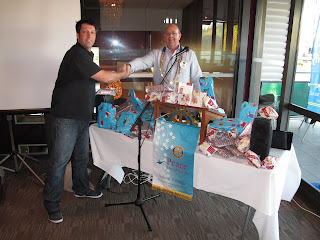 The Rotary Club
of Raiatea – Tahaa in French Polynesia (Rotary District 9920) celebrated its
8th anniversary in December 2012. The
club has 21 active members and two honorary members with the most recent
inducted in December 2012.
The Rotary Club
of Raiatea – Tahaa in French Polynesia (Rotary District 9920) celebrated its
8th anniversary in December 2012. The
club has 21 active members and two honorary members with the most recent
inducted in December 2012.
They were the
second Rotary Club of Polynesia with the first being the Rotary Club of Papeete
in 1959. The club grows from year to year in both membership and service which is
not just encouraging, but demonstrates its commitment to the community with
their actions [projects] widely recognized. The secret of this success is the
certain friendship uniting all members.
At the
international level, since the club is part of Rotary International, they support
global major projects, such as:
- The eradication of poliomyelitis in the world – now eradicated 99% thanks to Rotary,
- the access to drinking water in third world countries, the fight against illiteracy, etc.
The club also
sponsors a young Filipino supporting costs from the high school study. Jared
Orelland has just finished his upper studies and next will be attending
college.
This success is
extra motivation for the club.
Locally many
projects have been accomplished: linguistic and cultural trips of high school
students; material assistance to needy people, financial aid for young athletes
and Christmas Child.
Last year 600
children from the town of Taputapuatea were able to attend a magic show. What’s
more encouraging is to see these little ones laugh and dream. This led the club
to extend this action and this year all children receiving schooling in the
municipality of Tumaraa will be able to attend a big clown show in December
next.
The club has
committed to finance the acquisition last year of a small sailboat, fitted out
to enable sailing for disabled or people with limited mobility. The sailing
school of the Raiatea Yacht Club is the only one accommodating a handicapped
children, and where they are welcomed.
 |
| DG Ron at the cheque presentation |
To support this
project the club presented the Yacht Club a cheque for a million francs [NZD13,500
approx] to realize this project. In acknowledging the sponsors who also
supported this project, club President Patrick Leininger commented that “sometimes just a little boost, a helping hand, a moral presence, material
help in a difficult time, to avoid many conflicts and promote peace.”















